- Clone
- Poly5036 (See other available formats)
- Regulatory Status
- RUO
- Other Names
- Angiotensin I Converting Enzyme 2, Angiotensin I Converting Enzyme (Peptidyl-Dipeptidase A) 2, Angiotensin-Converting Enzyme Homolog, ACE-Related Carboxypeptidase, Peptidyl-Dipeptidase A, ACEH, ACE-2
- Isotype
- Goat Polyclonal IgG
- Ave. Rating
- Submit a Review
- Product Citations
- publications
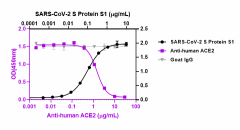
-

Biotinylated recombinant SARS-CoV-2 Spike protein S1 (black circles) (Cat. No. 793806) binds to immobilized recombinant human ACE2-Fc chimera (carrier-free) (Cat. No. 793206). LEAF™ purified anti-human ACE2 antibody (Poly5036) (purple squares) inhibits the binding in a dose-dependent manner whereas the LEAF™ purified goat IgG isotype ctrl antibody (gray triangles) does not have the effect. This antibody blocks the binding of 0.5 µg/mL biotinylated recombinant SARS-CoV-2 Spike protein S1 (Cat. No. 793806) to 1 µg/mL immobilized recombinant human ACE2-Fc chimera (carrier-free). ND50 = 1 - 6 µg/mL. -

Whole cell extracts (15 µg protein) from HeLa cells (negative control), human kidney and human testis tissue (positive controls), and mouse kidney tissue were resolved on a 4-12% Bis-Tris gel and transferred to a PVDF membrane. Membranes were probed with 0.25 µg/mL of purified anti-human ACE2 antibody (Poly5036) for 2 hours at room temperature. Proteins were visualized by chemiluminescence detection using HRP donkey anti-rabbit IgG antibody (Cat. No. 406401) at a 1:3000 dilution. Direct-Blot™ HRP anti-GAPDH antibody (Cat. No. 607904) was used as a loading control at a 1:25000 dilution (lower). Lane M: Molecular weight marker. -

Human paraffin-embedded testis tissue slice was prepared with a standard protocol of deparaffinization and rehydration. Antigen retrieval was done with Sodium Citrate H.I.E.R. 1X at 95°C for 40 minutes. Tissue was washed with PBS/0.05% Tween 20 twice for five minutes, and blocked with 5% FBS and 0.2% gelatin for 30 minutes. Then, the tissue was stained with 10 µg/mL purified anti-human ACE2 (Poly5036) at 4°C overnight, followed by 2.5 µg/mL anti-goat IgG Alexa Fluor® 647 (red) for two hours at room temperature. Nuclei were counterstained with DAPI (blue). The image was captured with a 10X objective. -

Angiotensin-converting enzyme 2 (ACE2) transfectants were stained with polyclonal purified anti-human ACE2 antibody (Poly5036) (left) or cell only (right) followed by anti-goat IgG AF647 secondary antibody and anti-His Tag PE (clone J095G46). Dot plots excluded dead cells.
| Cat # | Size | Price | Quantity Check Availability | Save | ||
|---|---|---|---|---|---|---|
| 503602 | 100 µg | $440 | ||||
ACE2 is a member of the angiotensin-converting enzyme family of dipeptidyl carboxydipeptidases. It catalyzes the cleavage of the decapeptide angiotensin I into angiotensin-(1-9) and angiotensin II (potent vasoconstrictor) into the vasodilator angiotensin-(1-7). ACE2 is a type I membrane protein that functions as a carboxypeptidase. It cleaves between a proline and a single hydrophobic/basic residue from the COOH-terminus of its substrates. The human full-length enzyme possesses 805 amino acids and the ECD includes amino acids 1–740. ACE2 is a zinc metalloprotease with considerable homology to angiotensin I-converting enzyme (ACE), both enzymes contain the typical HEXXH zinc-binding motif, ACE has two catalytic sites and ACE2 has only one, and ACE2 is not inhibited by ACE inhibitors captopril, lisinopril, and enalaprilat. Studies in mice showed that disruption of ACE2 induced a severe cardiac contractility defect and increased angiotensin II levels in heart. Human ACE2 has been identified as the receptor for SARS (severe acute respiratory syndrome)-coronavirus. ACE2 binds to the coronavirus S protein present on the surface of the virion. The S protein is a type I protein with four domains that include an S1 (receptor binding subunit), an S2 (membrane-fusion subunit), a transmembrane, and a short intracellular domain. The S protein forms a trimer showing a big protrusion from the virus surface. Studies in SARS-CoV-ACE2 interactions showed that specific amino acids (Lys31 and Lys353) in human ACE2 were critical to virus-receptor binding, and naturally selected viral mutations in S1 (K479N and S487T) enhanced the affinity of S1 for human ACE2.
Product DetailsProduct Details
- Verified Reactivity
- Human
- Antibody Type
- Polyclonal
- Host Species
- Goat
- Immunogen
- Recombinant human ACE2
- Formulation
- 0.2 µm filtered in phosphate-buffered solution, pH 7.2, containing no preservative.
- Endotoxin Level
- Less than 0.1 EU/µg of the protein (< 0.01 ng/µg of the protein) as determined by the LAL test.
- Preparation
- The LEAF™ (Low Endotoxin, Azide-Free) antibody was purified by affinity chromatography.
- Concentration
- The antibody is bottled at the concentration indicated on the vial. To obtain lot-specific concentration and expiration, please enter the lot number in our Certificate of Analysis online tool.
- Storage & Handling
- Upon receipt, store frozen at -20°C. Make small volume aliquots if needed and avoid repeated freeze-thaw cycles to prevent denaturing the antibody.
- Application
-
Block - Quality tested
WB, IHC-P, FC - Verified - Recommended Usage
-
Each lot of this antibody is quality control tested by blocking the binding of 0.5 µg/mL biotinylated recombinant SARS-CoV-2 Spike protein S1 to 1 µg/mL immobilized recombinant human ACE2-Fc chimera (carrier-free) (Cat. No. 793206). ND50 = 1 - 6 µg/mL. For western blotting, the suggested use of this reagent is 0.1 - 1.0 µg/mL. For flow cytometric staining, the suggested use of this reagent is ≤ 1.0 µg per million cells in 100 µL volume. For formalin-fixed paraffin-embedded immunohistochemical staining, a concentration range of 5 - 10 µg/mL is suggested. It is recommended that the reagent be titrated for optimal performance for each application.
- Application Notes
-
This clone has less reactivity to endothelium cells.
- Product Citations
-
- RRID
-
AB_2892475 (BioLegend Cat. No. 503602)
Antigen Details
- Structure
- Monomer
- Distribution
-
Vascular endothelial cells of the heart, kidney, brain, and testis
- Function
- Regulates renal and cardiovascular function
- Interaction
- Angiotensin I and angiotensin II are substrates for ACE2.
- Ligand/Receptor
- Spike glycoprotein expressed in human coronaviruses such as HCoV-NL63, SARS-CoV, and SARS-CoV-2.
- Antigen References
-
- Crackower MA, et al. 2002. Nature. 417:822-8.
- Vickers C, et al. 2002. J Biol Chem. 277:14838-43.
- Tikellis C, et al. 2003. Hypertension. 41:392-7.
- Guan Y, et al. 2003. Science. 302:276-8.
- Li F, et al. 2005. Science. 309:1864-8.
- Ferrario CM, et al. 2005. Am J Physiol Heart Circ Physiol. 289: H2281-90.
- Perlman S & Netland J. 2009. Nat Rev Microbiol. 7:439-50.
- Wu K, et al. 2011. J Virol. 85:5331-7.
- Ge XY, et al. 2013. Nature. 503:535-8.
- Letko M, et al. 2020. Nat Microbiol. 5:562-569.
- Gene ID
- 59272 View all products for this Gene ID
- UniProt
- View information about ACE2 on UniProt.org
Related Pages & Pathways
Pages
Related FAQs
- Do you guarantee that your antibodies are totally pathogen free?
-
BioLegend does not test for pathogens in-house aside from the GoInVivo™ product line. However, upon request, this can be tested on a custom basis with an outside, independent laboratory.
- Does BioLegend test each Ultra-LEAF™ antibody by functional assay?
-
No, BioLegend does not test Ultra-LEAF™ antibodies by functional assays unless otherwise indicated. Due to the possible complexities and variations of uses of biofunctional antibodies in different assays and because of the large product portfolio, BioLegend does not currently perform functional assays as a routine QC for the antibodies. However, we do provide references in which the antibodies were used for functional assays and we do perform QC to verify the specificity and quality of the antibody based on our strict specification criteria.
- Does BioLegend test each Ultra-LEAF™ antibody for potential pathogens?
-
No, BioLegend does not test for pathogens in-house unless otherwise indicated. However, we can recommend an outside vendor to perform this testing as needed.
- Have you tested this Ultra-LEAF™ antibody for in vivo or in vitro applications?
-
We don't test our antibodies for in vivo or in vitro applications unless otherwise indicated. Depending on the product, the TDS may describe literature supporting usage of a particular product for bioassay. It may be best to further consult the literature to find clone specific information.
Other Formats
View All ACE2 Reagents Request Custom Conjugation| Description | Clone | Applications |
|---|---|---|
| LEAF™ Purified anti-human ACE2 | Poly5036 | Block,WB,IHC-P,FC |
Customers Also Purchased
Compare Data Across All Formats
This data display is provided for general comparisons between formats.
Your actual data may vary due to variations in samples, target cells, instruments and their settings, staining conditions, and other factors.
If you need assistance with selecting the best format contact our expert technical support team.
 Login/Register
Login/Register 









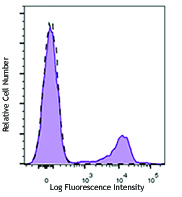
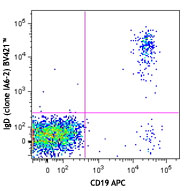

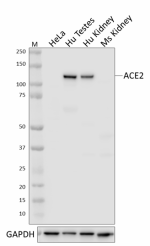
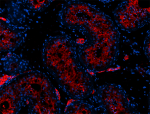




Follow Us